[2011] 1 SLR 517 - Holland Leedon Pte Ltd - Singapore Law
[2011] 1 SLR 517 - Holland Leedon Pte Ltd - Singapore Law
[2011] 1 SLR 517 - Holland Leedon Pte Ltd - Singapore Law
Create successful ePaper yourself
Turn your PDF publications into a flip-book with our unique Google optimized e-Paper software.
522 SINGAPORE LAW REPORTS [<strong>2011</strong>] 1 <strong>SLR</strong><br />
Warranties and Indemnities on Share and Asset Sales (Robert Thompson<br />
gen ed) (Sweet & Maxwell, 7th Ed, 2008) at para 13-04. There is, in the SPA,<br />
no warranty as to the final EBIDTA, and quite naturally so since the<br />
Purchaser participated in the completion accounts process which yielded<br />
the EBIDTA. The purchaser takes the EDIBTA which he agreed to and to<br />
which was then applied the agreed multiple to arrive at the purchase price.<br />
The underlying business approach reflected here is one of caveat emptor.<br />
9 The Vendor is alleged to have breached a number of warranties in the<br />
SPA. Under the general law of contract the Purchaser would be able to<br />
recover its expectation losses, measured either by the cost of cure or by the<br />
diminution in the value of the Vendor’s business. But the Purchaser is<br />
arguing that the alleged breaches of warranty would diminish the EBIDTA<br />
and correspondingly the purchase price which is a multiple of the EDIBTA.<br />
On this basis it is claiming the difference between the purchase price it paid<br />
and the purchase price computed on the basis of the (allegedly) reduced<br />
EDIBTA multiplied by the multiplier. However, the Purchaser is not<br />
challenging the EDIBTA agreed to by the parties, and indeed it could not<br />
have done so as there were no warranties as to the EDIBTA, nor fraud or<br />
patent error in the completion accounts. In these circumstances, it seems to<br />
me that if the Purchaser’s claim was allowed to proceed, it would have the<br />
effect of subverting a commonly used mechanism for determining the<br />
purchase price in acquisitions of businesses and shares. In my view,<br />
therefore, the decision of the learned arbitrator that the Purchaser is<br />
allowed to pursue his claim as described is at least open to serious doubt. I<br />
am further of the view that the issue, relating as it does to a commonly used<br />
commercial pricing mechanism, is one of general public importance.<br />
Section 49(5)(c)(ii) is therefore satisfied. I am fortified in my conclusion by<br />
the decision of Judith Prakash J’s to strike out the Purchaser’s claims to<br />
substantially similar effect against the Vendor’s directors in connection<br />
with the same acquisition: see Metalform Asia <strong>Pte</strong> <strong>Ltd</strong> v Ser Kim Koi [2009]<br />
1 <strong>SLR</strong>(R) 369. The record shows that, on appeal, the Court of Appeal only<br />
disagreed with Prakash J to the extent that it thought that leave to amend<br />
the untenable claim should be granted.<br />
10 For similar reasons, I think it is just and proper in all the<br />
circumstances for an appeal to lie to the court.<br />
Section 49(6): identification of question of law to be determined<br />
11 The Purchaser argued that the Vendor has not formulated or<br />
identified any question of law arising from the Decision by the learned<br />
arbitrator, and therefore failed to satisfy s 45(6) of the Act. Again I am<br />
unable to accede. It is first of all doubtful that s 49(6) of the Act is a<br />
condition precedent to the grant of leave (as opposed to a mere procedural<br />
requirement), since it is not placed in s 49(5). In any case, the Vendor is<br />
clearly disputing the effect of a contractual term, and it is beyond


![[2011] 1 SLR 517 - Holland Leedon Pte Ltd - Singapore Law](https://img.yumpu.com/37155958/6/500x640/2011-1-slr-517-holland-leedon-pte-ltd-singapore-law.jpg)
![[2011] 1 SLR 727 - Singapore Law](https://img.yumpu.com/51140774/1/166x260/2011-1-slr-727-singapore-law.jpg?quality=85)
![[1983-1984] SLR(R) 447 - Artic Builders & Co - Singapore Law](https://img.yumpu.com/50909204/1/164x260/1983-1984-slrr-447-artic-builders-co-singapore-law.jpg?quality=85)
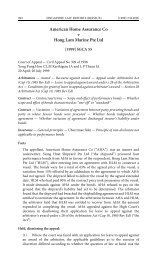
![[1996] 2 SLR(R) 292 - Lim Eng Hock Peter v ... - Singapore Law](https://img.yumpu.com/47482222/1/164x260/1996-2-slrr-292-lim-eng-hock-peter-v-singapore-law.jpg?quality=85)
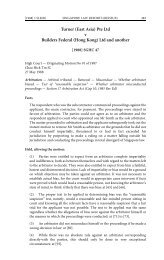
![[2006] 1 SLR(R) 197 - PT Asuransi Jasa Indonesia - Singapore Law](https://img.yumpu.com/46425352/1/164x260/2006-1-slrr-197-pt-asuransi-jasa-indonesia-singapore-law.jpg?quality=85)
![[1985-1986] SLR(R) 503 - Woh Hup (Pte) - Singapore Law](https://img.yumpu.com/45676364/1/164x260/1985-1986-slrr-503-woh-hup-pte-singapore-law.jpg?quality=85)

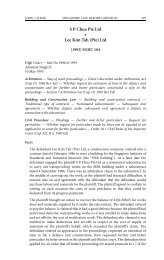
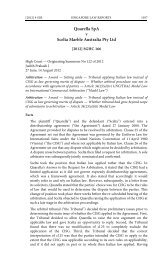
![[2010] 2 SLR 821 - Singapore Law](https://img.yumpu.com/43145563/1/166x260/2010-2-slr-821-singapore-law.jpg?quality=85)
![[2007] 1 SLR(R) 597 - PT Asuransi Jasa Indonesia - Singapore Law](https://img.yumpu.com/42983489/1/164x260/2007-1-slrr-597-pt-asuransi-jasa-indonesia-singapore-law.jpg?quality=85)
![[1989] 1 SLR(R) 433 - Singapore Law](https://img.yumpu.com/42649524/1/164x260/1989-1-slrr-433-singapore-law.jpg?quality=85)
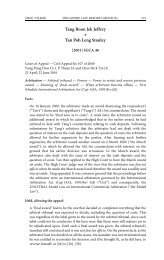
![[1997] 3 SLR(R) 360 - Singapore Law](https://img.yumpu.com/42287507/1/164x260/1997-3-slrr-360-singapore-law.jpg?quality=85)